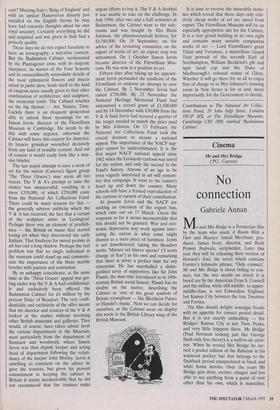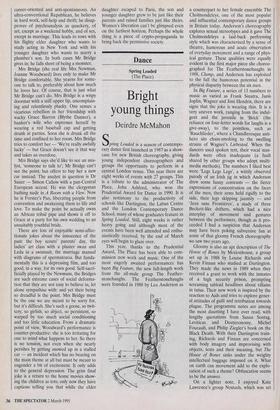Cinema
No connection
Gabriele Annan
Mr and Mrs Bridge is a Forsterian film by the team who made A Room With a View and Maurice: Ismail Merchant, pro- ducer, James Ivory, director, and Ruth Prawer Jhabvala, scriptwriter. Later this year they will be releasing their version of Howard's End, the novel which contains Forster's leitmotiv phrase, 'Only connect'. Mr and Mrs Bridge is about failing to con- nect, but the two novels on which it is based are by the American Evan S. Connell and the milieu, while still middle- to upper- middle-class, is not Edwardian England, but Kansas City between the late Twenties and Forties.
The film should delight nostalgia freaks with an appetite for correct period detail. But it is not exactly enthralling — the Bridges' Kansas City is not Twin Peaks, and very little happens there. Mr Bridge (Paul Newman looking just like George Bush only less cheery) is a well-to-do attor- ney. When he wooed Mrs Bridge be car- ried a pocket edition of the Rubaiyat in his waistcoat pocket; but that belongs to the flashback period encapsulated in black and white home movies. Over the years Mr Bridge gets drier, sterner, stingier and less able to see anything from a point of view other than his own, which is masculine, career-oriented and anti-spontaneous. An ultra-conventional Republican, he believes in hard work, self-help and thrift; he disap- proves of psychoanalysis as quackery, of art, except as a weekend hobby, and of sex, except in marriage. This leads to rows with his flighty elder daughter who wants to study acting in New York and with his younger daughter who wants to marry a plumber's son. In both cases Mr Bridge gives in; he falls short of being a monster.
Mrs Bridge (the real life Mrs Newman, Joanne Woodward) lives only to make Mr Bridge comfortable. She yearns for some- one to talk to, preferably about how much he loves her. Of course, that is just what Mr Bridge can't do. Mrs Bridge is a wispy doormat with a stiff upper lip, uncomplain- ing and relentlessly plucky. One senses a vicarious rebellion in her friendship with wacky Grace Barron (Blythe Danner), a banker's wife who expresses herself by wearing a red baseball cap and getting drunk at parties. Soon she is drunk all the time and confined to her room. Mrs Bridge tries to comfort her — 'We're really awfully lucky' — but Grace doesn't see it that way and takes an overdose.
Mrs Bridge says she'd like to see an ana- lyst, 'someone to talk to'; Mr Bridge can't see the point, but offers to buy her a new car instead. The analyst in question is Dr Sauer — Simon Callow with a pan-Central European accent. He was the clergyman bathing nude in A Room with a View. Now he is Forster's Pan, liberating people from convention and awakening them to life and love. To make the point he actually owns an African tribal pipe and shows it off to Grace at a party for his own wedding to an unsuitably youthful bride.
There are lots of enjoyable semi-affec- tionate jokes about the innocence of the past: the boy scouts' parents' day, the ladies' art class with a plaster swan and Leda in a swimsuit, the marriage manual with diagrams of spermatozoa. But funda- mentally this is a depressing film, and too good, in a way, for its own good. Self-sacri- ficially played by the Newmans, the Bridges are such extreme cases of social deforma- tion that they are not easy to believe in, let alone sympathise with: and yet their being so dreadful is the point. Mrs Bridge must be the one we are meant to be sorry for, but it's difficult. She's such a goose, so twit- tery, so girlish, so abject, so persistent, so warped by too much social conditioning and too little education. From a dramatic point of view, Woodward's performance is counter-productive: she is too irritating for one to mind what happens to her. So there is no tension, not even when she nearly perishes by getting snowed up in a stalled car — an incident which has no bearing on the main theme at all but must be meant to engender a bit of excitement. It only adds to the general depression. The grim final joke is a return to the home movies show- ing the children as tots; only now they have captions telling you that while the elder
daughter escaped to Paris, the son and younger daughter grew to be just like their parents and raised families just like theirs. Women's liberation can't be glimpsed even on the farthest horizon. Perhaps the whole thing is a piece of crypto-propaganda to bring back the permissive society.



















































 Previous page
Previous page